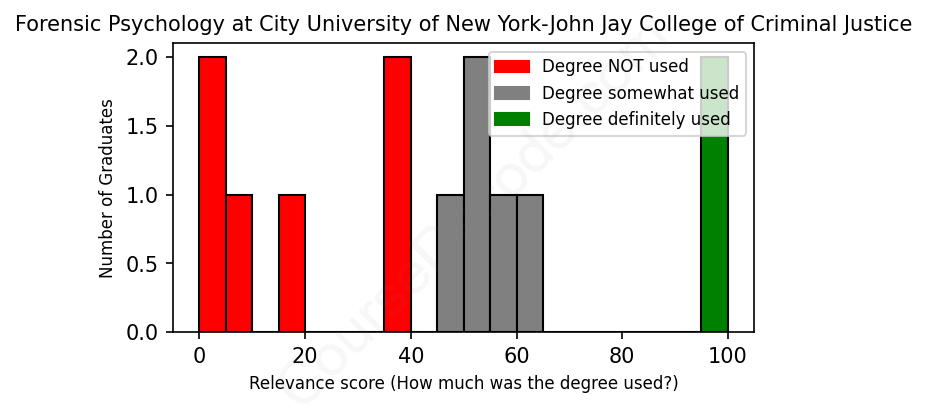
First, some facts. Of the Forensic Psychology graduates from City University of New York-John Jay College of Criminal Justice we've analyzed , here's how many have used (or NOT used) their degree in their career:

These are estimates based on AI analysis of 13 LinkedIn profiles (see below).
The verdict? Bad. Overall, with an average relevance score of 43%, Forensic Psychology graduates from City University of New York-John Jay College of Criminal Justice have a substantially lower likelihood (-24%) of finding work in this field compared to the average graduate across all fields:
And for comparison, here's the chart for all profiles we've looked at across all degrees.
Also, after graduating, 46% of these graduates have pursued further education other than another Bachelor's degree (such as a Masters degree or other), compared to the average across all profiles of 35%. This suggests you may need more than just a Bachelors degree to be competitive as a Forensic Psychology graduate.
See the details:
|
Relevance score: 0% We think this person has NOT gone into a career related to their degree. We think this person has NOT gone into a career related to their degree.
DEGREE INFOGraduated in 2014 from City University of New York-John Jay College of Criminal Justice with a Bachelor of Arts (B.A.) in Forensic Psychology. No other secondary education since. JOB HISTORY SINCE GRADUATIONSupervisor Carter's | OshKosh B'gosh Sep 2017 - Present ABOUTNo information provided. |
The top 10 most common jobs done by the graduates we've analyzed (ranked most common to least) are:
When looking at the job titles of people who graduated with a degree in Forensic Psychology from John Jay College, it seems like there are two main paths: some have landed roles that really tie back to their studies, while many have ended up in jobs that are pretty far removed from the field. For instance, positions like a New York State Peace Officer and Forensic Case Manager clearly make use of the skills and knowledge acquired during their education, focusing on understanding criminal behavior and facilitating interventions. On the flip side, roles like Wardrobe Stylist or Sales Associate are almost entirely unrelated, leaning more towards customer service and fashion, with no real connection to forensic principles. It tells us something about the job market—many graduates are getting jobs that may not directly apply their education.
Overall, it seems like only a relatively small portion of the alumni have found jobs that fully utilize their Forensic Psychology training. While some are successfully navigating roles in law enforcement, case management, or clinical settings, many others have gone into jobs that don’t really lean on their degree at all. It shows a mix of opportunity and perhaps a bit of disconnection between their studies and the job market. So, while the degree can definitely lead to some rewarding careers, there’s still quite a number of graduates who find themselves taking paths that wouldn’t be seen as directly relevant to what they studied.
Here is a visual representation of the most common words in job titles for Forensic Psychology graduates (this is across all Forensic Psychology graduates we've analyzed, not just those who went to City University of New York-John Jay College of Criminal Justice):

Looking at the career trajectories of graduates from the Forensic Psychology program at John Jay College, it seems like there's quite a mix when it comes to job outcomes. For most of these folks, their first jobs after graduation tend to be in related fields, particularly in areas like law enforcement, social services, and administrative roles associated with criminal justice. For example, some graduates stepped into roles as Special Patrolmen or took positions that involved direct support in mental health and social work. But on the flip side, there are also quite a few who have landed in jobs that seem pretty far removed from forensic psychology, like wardrobe styling or being a sales associate. This suggests that while some found a path directly related to their studies, others may have struggled a bit more to connect their degree with their first entry into the job market.
Fast forward five to ten years after graduation, and the picture becomes even more varied. Many graduates are still in relevant roles, edging toward established careers as case managers, clinical directors, and social workers, which is super promising. However, there are also individuals who have drifted into unrelated industries like real estate and event planning, indicating that not everyone found a satisfying long-term career path in forensic psychology or adjacent fields. It's a bit of a mixed bag—some are thriving and making a difference in criminal justice and mental health, while others seem to be navigating a patch of detours that prompts you to question how well their degree prepared them for the job market. So, while there are definitely success stories here, it's also clear that many graduates have taken unconventional routes away from their original field of study.
Honestly, pursuing a Bachelor’s degree in Forensic Psychology can be a pretty challenging ride, but it’s definitely manageable if you’re motivated and really interested in the subject. At schools like John Jay College, you’ll be looking at a mix of psychology, criminal justice, and even some law courses, which can be pretty intense and require critical thinking and a lot of reading. That said, while it can be tough—especially with all the theories and case studies—you’ll find that if you keep up with your assignments and engage with the material, it’s not insurmountable. Just like any degree, it’s all about staying organized and putting in the effort!
Most commonly, in the LinkedIn profiles we've looked at, it takes people 3 years to finish a Bachelor degree in Forensic Psychology.
Looking at the career paths of these Forensic Psychology grads from John Jay College, it seems like their earnings vary quite a bit. Some of them landed jobs in law enforcement and healthcare, which can offer decent income, especially with experience, while others took on roles in retail or administrative work, which typically don't pay as well. For example, the Peace Officer position likely pays better than the sales associate gig, but still, many seem to be starting in lower-paying roles (like assistants or coordinators) before potentially moving up the ladder. Overall, it feels like while some are on the right track to making solid money, others might be struggling to find higher-paying opportunities right out of college. So, it's a mixed bag depending on the specific job and field they chose!
Here is a visual representation of the most common words seen in the "about" section of LinkedIn profiles who have a Bachelor degree in Forensic Psychology (this is across all Forensic Psychology graduates we've analyzed, not just those who went to City University of New York-John Jay College of Criminal Justice). This may or may not be useful:

Here are all colleges offering a Bachelor degree in Forensic Psychology (ordered by the average relevance score of their Forensic Psychology graduates, best to worst) where we have analyzed at least 10 of their graduates:
| College | Score | Count |
|---|---|---|
 Southern New Hampshire University Southern New Hampshire University
|
61 | 14 |
 John Jay College (CUNY) John Jay College (CUNY)
|
51 | 53 |
 City University of New York-John Jay College of Criminal Justice City University of New York-John Jay College of Criminal Justice
|
43 | 13 |